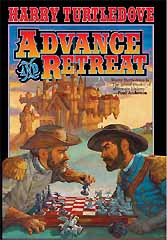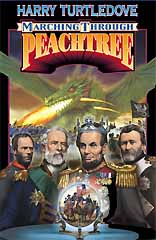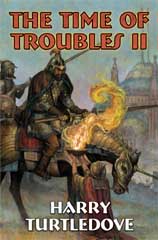
Ever since the assassination of King Louis XIII and the overthrow of his chief minister, Cardinal Richelieu, France has been in political and military turmoil. The possibility—even the likelihood—of revolution hovers in the background. The new king Gaston, whom many consider an usurper, is no friend of France’s Protestants, known as the Huguenots. The fears and hostility of the Huguenots toward the French crown have only been heightened by the knowledge brought back in time by the Americans of the town of Grantville. Half a century in the future, the French king of the time would revoke the Edict of Nantes of 1598, which proclaimed that the rights of Huguenots would be respected. At the center of all this turmoil is the universally recognized leader of the Huguenots: Duke Henri de Rohan. He knows from the same up-time history books that he is “scheduled” to die less than two years in the future and he has pressing problem on his hands. His estranged wife and brother are siding with the usurper Gaston and plotting against him. Still worse, his sole child and heir is his nineteen-year-old daughter Marguerite. He believes he has less than two years to find a suitable husband for her—but acceptable Calvinist noblemen, French or foreign, are sparse at the moment. What’s a father to do?
The Trouble with Huguenots
SKU: 9781625799777
$6.99


Select the format you would like to download:
Download Unzipped Files
EPUB/Kindle/Apple iOS/Nook Format
Download Zip Files

More books by Virginia DeMarce (12)

3xT
Two Complete Novels and a Selection of Shorter Masterworks by a Hugo Award Winning Master of Science Fiction Adventure. Praise for the Science Fiction of Harry Turtledove: "[In The Great War: Breakthroughs,] Turtledove displays his usual mastery at maintaining suspense across a broad canvas, with characters that fans will be glad to encounter . . . . A complete and skillfully executed tale." —Publishers Weekly "[Turtledove's The Victorious Opposition is] almost impossible to praise too highly." —Booklist "Turtledove has proved he can divert his readers to astonishing places. He's developed a cult following over the years . . . I know I'd follow his imagination almost anywhere." —San Jose Mercury News "The leading author of alternate history." —USA Today Hugo Award winner Harry Turtledove has garnered high praise for his best-selling alternate history science fiction, and he's equally a master of science fiction adventure, as he proves in this new Baen MegaBook containing two complete novels and a baker's dozen of brilliant shorter works. Earthgrip—Young Jennifer Logan just wanted to teach Middle English, but ended up on an interstellar trading ship headed for the adventure of a lifetime. Noninterference — The Survey Service was supposed to observe alien worlds, without any interference. Then, an expedition broke the rule and an entire planet was at risk! Kaleidoscope —Suppose a vampire was sent to catch Jack the Ripper Suppose all the galaxy has starships, but hasn't developed Earth's military technology and firepower. And much more. Publisher's Note: 3 X T was originally published as three books: Earthgrip, Noninterference and Kaleidoscope. This is their first combined publication.

Two Complete Novels and a
Selection of Shorter Masterworks
by a Hugo Award Winning
Master of Science Fiction Adventure.
Praise for the Science Fiction of Harry Turtledove:
"[In The Great War: Breakthroughs,] Turtledove displays his usual mastery at maintaining suspense across a broad canvas, with characters that fans will be glad to encounter . . . . A complete and skillfully executed tale." —Publishers Weekly
"[Turtledove's The Victorious Opposition is] almost impossible to praise too highly." —Booklist
"Turtledove has proved he can divert his readers to astonishing places. He's developed a cult following over the years . . . I know I'd follow his imagination almost anywhere." —San Jose Mercury News
"The leading author of alternate history." —USA Today
Hugo Award winner Harry Turtledove has garnered high praise for his best-selling alternate history science fiction, and he's equally a master of science fiction adventure, as he proves in this new Baen MegaBook containing two complete novels and a baker's dozen of brilliant shorter works. Earthgrip—Young Jennifer Logan just wanted to teach Middle English, but ended up on an interstellar trading ship headed for the adventure of a lifetime. Noninterference — The Survey Service was supposed to observe alien worlds, without any interference. Then, an expedition broke the rule and an entire planet was at risk! Kaleidoscope —Suppose a vampire was sent to catch Jack the Ripper Suppose all the galaxy has starships, but hasn't developed Earth's military technology and firepower. And much more.
Publisher's Note: 3 X T was originally published as three books: Earthgrip, Noninterference and Kaleidoscope. This is their first combined publication.

Select the format you would like to download:
Download Unzipped Files
EPUB/Kindle/Apple iOS/Nook Format
Download Zip Files
EPUB/Kindle/Apple iOS/Nook Format Zip

Advance and Retreat
THE NORTH SHALL RISE AGAIN!When Avram became King of Detina, he declared he intended to liberate the blond serfs from their ties to the land. This noble assertion immediately plunged the kingdom into a civil war that would prove long and bloody, and set brother against brother. The northern provinces, dependent on their serf's labor, seceded, choosing Avram's cousin, Grand Duke Geoffrey, as their king. To save the kingdom, Avram sent armies clad in gray against the slave-holding North, battling Geoffrey's army, arrayed in blue.Though King Avram held more land and wealth than Geoffrey, Geoffrey's men were better soldiers and the North had better and more powerful wizards. Still, as the war raged on, greater population and superior organization began to tell and the tide turned against the North.Even so, the war is far from over. The South still faces two formidable leaders: General Bell, whose loss of a leg has only strengthened his resolve, and Ned of the Forest, whose unicorn riders are the most dangerous force on the Northern side. And though the Southern sorcerers have become more adept at war spells, use of sorcery is unpredictable—as the North learned earlier when its forces held an almost impregnable position, but retreated in terror when an overconfident sorcerer's spell went awry.Though victory seems in sight for the South, its armies must now battle the North on its own ground, ground which will prove treacherous and deadly. . . .ABOUT THE AUTHORHarry Turtledove is known for his historical fantasy and alternate history. His novels include The Case of the Toxic Spell Dump, Sentry Peak, Marching Through Peachtree, The Guns of the South, and the Great War and World at War series. A Hugo winner and Nebula finalist, he lives in Los Angeles.

THE NORTH SHALL RISE AGAIN!
When Avram became King of Detina, he declared he intended to liberate the blond serfs from their ties to the land. This noble assertion immediately plunged the kingdom into a civil war that would prove long and bloody, and set brother against brother. The northern provinces, dependent on their serf's labor, seceded, choosing Avram's cousin, Grand Duke Geoffrey, as their king. To save the kingdom, Avram sent armies clad in gray against the slave-holding North, battling Geoffrey's army, arrayed in blue.
Though King Avram held more land and wealth than Geoffrey, Geoffrey's men were better soldiers and the North had better and more powerful wizards. Still, as the war raged on, greater population and superior organization began to tell and the tide turned against the North.
Even so, the war is far from over. The South still faces two formidable leaders: General Bell, whose loss of a leg has only strengthened his resolve, and Ned of the Forest, whose unicorn riders are the most dangerous force on the Northern side. And though the Southern sorcerers have become more adept at war spells, use of sorcery is unpredictable—as the North learned earlier when its forces held an almost impregnable position, but retreated in terror when an overconfident sorcerer's spell went awry.
Though victory seems in sight for the South, its armies must now battle the North on its own ground, ground which will prove treacherous and deadly. . . .
ABOUT THE AUTHOR
Harry Turtledove is known for his historical fantasy and alternate history. His novels include The Case of the Toxic Spell Dump, Sentry Peak, Marching Through Peachtree, The Guns of the South, and the Great War and World at War series. A Hugo winner and Nebula finalist, he lives in Los Angeles.


Select the format you would like to download:
Download Unzipped Files
EPUB/Kindle/Apple iOS/Nook Format
Download Zip Files
EPUB/Kindle/Apple iOS/Nook Format Zip

Alternate Generals III
Once Again, Great Leaders Make Great History —but Not History as We Know It. . . . History shows that leadership is crucial in war, but there are other factors at work. What if history were given a twist or two, and great commanders on land and sea fought their greatest battles under different circumstances � Suppose General Douglas MacArthur had been captured before he could escape from Manila and became a prisoner of war � Suppose Joan of Arc had not been burned for heresy and had gone on to lead France to very different victories � Suppose Genghis Khan had been a convert to Judaism and his horde had fought for a different cause than in our universe Turtledove and his colleagues turn the past upside down and inside out, and the possibilities are endless. . . . ABOUT THE AUTHOR Hugo-winner, New York Times best-selling author, and historian—Harry Turtledove is equally renowned in science fiction for his rigorously thought-out alternate history novels and in fantasy for his tales of the supernatural placed in historically accurate settings. For Baen, he has written the alternate American Civil War fantasy trilogy comprising Sentry Peak, Marching Through Peachtree, and Advance and Retreat, as well as The Case of the Toxic Spell Dump, and the popular "Gerin the Fox" series, Wisdom of the Fox and Tale of the Fox. He has also authored the Ingram bestseller Guns of the South and the genre bestsellers in the "World at War" series for Del Rey.

Once Again, Great Leaders Make Great History
—but Not History as We Know It. . . .
History shows that leadership is crucial in war, but there are other factors at work. What if history were given a twist or two, and great commanders on land and sea fought their greatest battles under different circumstances
� Suppose General Douglas MacArthur had been captured before he could escape from Manila and became a prisoner of war
� Suppose Joan of Arc had not been burned for heresy and had gone on to lead France to very different victories
� Suppose Genghis Khan had been a convert to Judaism and his horde had fought for a different cause than in our universe
Turtledove and his colleagues turn the past upside down and inside out, and the possibilities are endless. . . .
ABOUT THE AUTHOR
Hugo-winner, New York Times best-selling author, and historian—Harry Turtledove is equally renowned in science fiction for his rigorously thought-out alternate history novels and in fantasy for his tales of the supernatural placed in historically accurate settings. For Baen, he has written the alternate American Civil War fantasy trilogy comprising Sentry Peak, Marching Through Peachtree, and Advance and Retreat, as well as The Case of the Toxic Spell Dump, and the popular "Gerin the Fox" series, Wisdom of the Fox and Tale of the Fox. He has also authored the Ingram bestseller Guns of the South and the genre bestsellers in the "World at War" series for Del Rey.


Select the format you would like to download:
Download Unzipped Files
EPUB/Kindle/Apple iOS/Nook Format
Download Zip Files
EPUB/Kindle/Apple iOS/Nook Format Zip

Blood Feuds
WAR WORLD VENDETTA It has been three hundred years since the Sauron remnant fled in secret to Haven. Blasted back into savagery by nuclear weapons, divided among themselves by bitter feuds, the human inhabitants were helpless before the initial onslaught of these gene-designed demons who walked like men and fought like battle computers. To the Saurons, humans were merely two-legged cattle, a source of breeding females and other tribute. But now a new voice is heard on Haven—a summons that will unite nomad and farmer, Mongol, Russki and Jew. Aisha, sister and daughter of Juchi the Accursed, has raised a banner that will sweep across the steppes like a wind of fire. Soon the tribes will meet before the Sauron Citadel—there to encounter the forces of a mad Cyborg Battlemaster in a final struggle to retake their world. Blood Feuds—and No Mercy.
WAR WORLD VENDETTA
It has been three hundred years since the Sauron remnant fled in secret to Haven. Blasted back into savagery by nuclear weapons, divided among themselves by bitter feuds, the human inhabitants were helpless before the initial onslaught of these gene-designed demons who walked like men and fought like battle computers. To the Saurons, humans were merely two-legged cattle, a source of breeding females and other tribute.
But now a new voice is heard on Haven—a summons that will unite nomad and farmer, Mongol, Russki and Jew. Aisha, sister and daughter of Juchi the Accursed, has raised a banner that will sweep across the steppes like a wind of fire. Soon the tribes will meet before the Sauron Citadel—there to encounter the forces of a mad Cyborg Battlemaster in a final struggle to retake their world. Blood Feuds—and No Mercy.

Select the format you would like to download:
Download Unzipped Files
EPUB/Kindle/Apple iOS/Nook Format
Download Zip Files
EPUB/Kindle/Apple iOS/Nook Format Zip

Blood Vengeance
HOLY WAR Three hundred years ago the Saurons arrived on Haven and proceeded to destroy every vestige of technology except their own. Since then, the history of Haven has been a horror story. But now one woman has sparked a rebellion, uniting the many tribes of Haven and joining together old enemies having nothing in common but their mutual hatred of the Sauron overlords. And at the Shangri-La valley this rabble in arms has done the impossible, and destroyed the Sauron force there. But, an outpost is a very different thing from the final target of Aisha's army: the Sauron Citadel. If, against all odds, the Citadel falls, the humans will take back their world from the Sauron invaders—and three centuries of repressed hate and fury will erupt in Blood Vengeance . . .
HOLY WAR
Three hundred years ago the Saurons arrived on Haven and proceeded to destroy every vestige of technology except their own. Since then, the history of Haven has been a horror story.
But now one woman has sparked a rebellion, uniting the many tribes of Haven and joining together old enemies having nothing in common but their mutual hatred of the Sauron overlords. And at the Shangri-La valley this rabble in arms has done the impossible, and destroyed the Sauron force there.
But, an outpost is a very different thing from the final target of Aisha's army: the Sauron Citadel. If, against all odds, the Citadel falls, the humans will take back their world from the Sauron invaders—and three centuries of repressed hate and fury will erupt in Blood Vengeance . . .

SKU: 0671722018
$4.00

Select the format you would like to download:
Download Unzipped Files
EPUB/Kindle/Apple iOS/Nook Format
Download Zip Files
EPUB/Kindle/Apple iOS/Nook Format Zip

Bridge of the Separator
THE NEW NOVEL IN THE POPULAR VIDESSOS SERIES Rhavas was a good, holy, and pious man—and the cousin of the Avtokrator. He would probably have become ecumenical patriarch of the Empire in the capital, Videssos the city . . . if his world had not suddenly and tragically fallen apart when the Empire of Videssos erupted into civil war and the Khamorth barbarians swarmed over the borders. As the home he loved was brutally sacked, Rhavas had to flee for his life, and then make his way through lands swarming with fierce nomads and with soldiers loyal both to his cousin and to the rebel. He may never see Videssos the city again, let alone preside in its High Temple. He has always followed Phos, the god of light and goodness, Videssos' god, and despised evil rival Skotos. Those who fall off the Bridge of the Separator during judgment in the afterlife tumble down to Skotos' ice forevermore. But when evil seems to have swallowed the whole world, what is a cleric who reverences logic as well as goodness supposed to believe It's a harder question than Rhavas wishes it were. FANTASY ADVENTURE BY A BEST-SELLING AWARD-WINNING MASTER

THE NEW NOVEL IN THE POPULAR VIDESSOS SERIES
Rhavas was a good, holy, and pious man—and the cousin of the Avtokrator. He would probably have become ecumenical patriarch of the Empire in the capital, Videssos the city . . . if his world had not suddenly and tragically fallen apart when the Empire of Videssos erupted into civil war and the Khamorth barbarians swarmed over the borders.
As the home he loved was brutally sacked, Rhavas had to flee for his life, and then make his way through lands swarming with fierce nomads and with soldiers loyal both to his cousin and to the rebel. He may never see Videssos the city again, let alone preside in its High Temple.
He has always followed Phos, the god of light and goodness, Videssos' god, and despised evil rival Skotos. Those who fall off the Bridge of the Separator during judgment in the afterlife tumble down to Skotos' ice forevermore. But when evil seems to have swallowed the whole world, what is a cleric who reverences logic as well as goodness supposed to believe
It's a harder question than Rhavas wishes it were.
FANTASY ADVENTURE BY A BEST-SELLING AWARD-WINNING MASTER


Select the format you would like to download:
Download Unzipped Files
EPUB/Kindle/Apple iOS/Nook Format
Download Zip Files
EPUB/Kindle/Apple iOS/Nook Format Zip

Exiled: Clan of the Claw
First entry in a new series with three big all new linked novellas from multiple best-sellers S.M. Stirling, John Ringo & Jody Lynn Nye, and Harry Turtledove! After the extinction asteroid DOESN'T strike Earth, the dinosaurs keep evolving—but so do the mammals. We mammals have achieved human-like shapes, but now it's cold-blooded, magic-using reptiles against the hot-blooded, hot-tempered descendants of cats. In a heroic, bronze-age world similar to 300, the Mrem Clan of the Claw and its sister warbands are expanding their rough-and-tumble territory, but now they face the Lishkash, masters of a cold-blooded empire of slave armies and magic. It's mammalian courage and adaptation against reptile cunning in a clash of steel and will that will determine which line shall inherit the Earth.
 John Ringo
John Ringo  S. M. Stirling
S. M. Stirling  Harry Turtledove
Harry Turtledove  Michael Z. Williamson
Michael Z. Williamson 
First entry in a new series with three big all new linked novellas from multiple best-sellers S.M. Stirling, John Ringo & Jody Lynn Nye, and Harry Turtledove! After the extinction asteroid DOESN'T strike Earth, the dinosaurs keep evolving—but so do the mammals. We mammals have achieved human-like shapes, but now it's cold-blooded, magic-using reptiles against the hot-blooded, hot-tempered descendants of cats.
In a heroic, bronze-age world similar to 300, the Mrem Clan of the Claw and its sister warbands are expanding their rough-and-tumble territory, but now they face the Lishkash, masters of a cold-blooded empire of slave armies and magic. It's mammalian courage and adaptation against reptile cunning in a clash of steel and will that will determine which line shall inherit the Earth.
Exiled: Clan of the Claw

SKU: 9781439134412
$6.99

 John Ringo
John Ringo  S. M. Stirling
S. M. Stirling  Harry Turtledove
Harry Turtledove  Michael Z. Williamson
Michael Z. Williamson 
Select the format you would like to download:
Download Unzipped Files
EPUB/Kindle/Apple iOS/Nook Format
Download Zip Files
EPUB/Kindle/Apple iOS/Nook Format Zip

Marching Through Peachtree
FREE THE BLONDES! (America's Civil War Turned Upside Down) A terrible civil war was tearing apart the kingdom of Detina, a land which could no longer be half serf and half free. When the new ruler, King Avram, announced his intent to liberate the blond serfs upon which the northern provinces depended, Detina was torn in two, and the rebellious north took Avram's cousin, Grand Duke Geoffrey, as their king. Neither side could expect an easy victory. The south was larger and wealthier, but the north had better soldiers and more powerful wizards. Led by officers riding unicorns, supplied by flying carpets, both sides had been clashing for three years when Count Thraxton, a conceited wizardgeneral whose opinions of his spell-casting ability far outstripped the reality, bungled a spell which backfired disastrously against his own side, giving the Unionists a decisive victory. But the war was far from over: Thraxton the idiot had been relieved of command; which meant that the south faced a far more competent general: Joseph the Gamecock. And Joseph and his troops were determined to hold Peachtree Province against the loyalist troops. They had occupied Rockface Rise, which offered only two narrow places where the Unionists could come at them, and had further fortified it with trenches and catapults. When the southern army attacked, they would face formidable obstacles both natural and manmade, as well as the repeating crossbows of the troops and the deadly sorcerous storm and lightning wielded by the northern wizards. Still, the very survival of Detina as one united realm was at stake, and King Avram's forces had no choice but to attack, no matter what the odds, no matter how desperate the situation ....

FREE THE BLONDES!
(America's Civil War Turned Upside Down)
A terrible civil war was tearing apart the kingdom of Detina, a land which could no longer be half serf and half free. When the new ruler, King Avram, announced his intent to liberate the blond serfs upon which the northern provinces depended, Detina was torn in two, and the rebellious north took Avram's cousin, Grand Duke Geoffrey, as their king.
Neither side could expect an easy victory. The south was larger and wealthier, but the north had better soldiers and more powerful wizards. Led by officers riding unicorns, supplied by flying carpets, both sides had been clashing for three years when Count Thraxton, a conceited wizardgeneral whose opinions of his spell-casting ability far outstripped the reality, bungled a spell which backfired disastrously against his own side, giving the Unionists a decisive victory.
But the war was far from over: Thraxton the idiot had been relieved of command; which meant that the south faced a far more competent general: Joseph the Gamecock. And Joseph and his troops were determined to hold Peachtree Province against the loyalist troops. They had occupied Rockface Rise, which offered only two narrow places where the Unionists could come at them, and had further fortified it with trenches and catapults. When the southern army attacked, they would face formidable obstacles both natural and manmade, as well as the repeating crossbows of the troops and the deadly sorcerous storm and lightning wielded by the northern wizards.
Still, the very survival of Detina as one united realm was at stake, and King Avram's forces had no choice but to attack, no matter what the odds, no matter how desperate the situation ....


Select the format you would like to download:
Download Unzipped Files
EPUB/Kindle/Apple iOS/Nook Format
Download Zip Files
EPUB/Kindle/Apple iOS/Nook Format Zip

Sentry Peak
THE STRANGEST CIVIL WAR NOVEL YOU EVER READ! When Avram became King of Detina, he declared he intended to liberate the blond serfs from their ties to the land. The northern provinces, where most of the serfs lived, would not accept his lordship. The hot north was a land of broad estates, whose noble overlords took the serfs' labor and gave back next to nothing. Those provinces left Detina, choosing Avram's cousin, Grand Duke Geoffrey, as their king in his place. Avram said he had inherited all of the kingdom, not just a part. He refused to let Geoffrey rule the north without a challenge. And the southron provinces, full of merchants and smallholders stood solidly behind him. So he sent armies clad in gray against the north. Geoffrey raised his own army, and arrayed his men in blue made from the indigo much raised on northern estates to distinguish them from the southrons. Avram held the larger part of the kingdom, and the wealthier part, too. But Geoffrey's men were bolder soldiers. And the north, taken all in all, had better wizards than the southrons did. The war raged for almost three years, until Avram's General named Guildenstern and his great lieutenant, Doubting George, moved against the northern army under Count Thraxton the Braggart and his commander of unicorn-riders, Ned of the Forest, which held the town of Rising Rock, close by Sentry Peak. . . .

THE STRANGEST CIVIL WAR
NOVEL YOU EVER READ!
When Avram became King of Detina, he declared he intended to liberate the blond serfs from their ties to the land. The northern provinces, where most of the serfs lived, would not accept his lordship. The hot north was a land of broad estates, whose noble overlords took the serfs' labor and gave back next to nothing. Those provinces left Detina, choosing Avram's cousin, Grand Duke Geoffrey, as their king in his place.
Avram said he had inherited all of the kingdom, not just a part. He refused to let Geoffrey rule the north without a challenge. And the southron provinces, full of merchants and smallholders stood solidly behind him. So he sent armies clad in gray against the north. Geoffrey raised his own army, and arrayed his men in blue made from the indigo much raised on northern estates to distinguish them from the southrons.
Avram held the larger part of the kingdom, and the wealthier part, too. But Geoffrey's men were bolder soldiers. And the north, taken all in all, had better wizards than the southrons did. The war raged for almost three years, until Avram's General named Guildenstern and his great lieutenant, Doubting George, moved against the northern army under Count Thraxton the Braggart and his commander of unicorn-riders, Ned of the Forest, which held the town of Rising Rock, close by Sentry Peak. . . .


Select the format you would like to download:
Download Unzipped Files
EPUB/Kindle/Apple iOS/Nook Format
Download Zip Files
EPUB/Kindle/Apple iOS/Nook Format Zip

The Enchanter Completed
TODAY'S TOP WRITERS PAY TRIBUTE TO A MASTER For seven decades, L. Sprague de Camp was a giant in both science fiction and fantasy, renowned for his fast-moving action-adventure tales filled with genial humorous touches and backed up with a profound knowledge of history and science. He was also renowned for his popular (and meticulously researched) novels of historical fiction, and his authoritative non-fiction books in many fields. Now, Hugo Award-winner and best-selling author Harry Turtledove has gathered together today's top writers and invited them to write stories in the same humorous adventure vein which de Camp practically invented. On board are Poul Anderson, Frederik Pohl, David Drake, Judith Tarr, Esther M. Friesner, Lawrence Watt-Evans, S.M. Stirling, Michael F. Flynn, Harry Turtledove himself, and more, including a personal remembrance of de Camp by Robert Silverberg. The result is a volume worthy of the Grand Master himself, and certain to enchant the reader—completely. The Masters Praise a Fellow Master: "Consistently humorous . . . he fills his stage with such authentic detail that empathy is built and never broken." —Robert A. Heinlein "[De Camp is the epitome of science fiction in all possible ways." —Isaac Asimov "He was an extraordinary writer, a pillar of our field . . . de Camp was one of the shapers of modern science fiction . . . [and] a superb storyteller." —Robert Silverberg

TODAY'S TOP WRITERS PAY TRIBUTE TO A MASTER
For seven decades, L. Sprague de Camp was a giant in both science fiction and fantasy, renowned for his fast-moving action-adventure tales filled with genial humorous touches and backed up with a profound knowledge of history and science. He was also renowned for his popular (and meticulously researched) novels of historical fiction, and his authoritative non-fiction books in many fields.
Now, Hugo Award-winner and best-selling author Harry Turtledove has gathered together today's top writers and invited them to write stories in the same humorous adventure vein which de Camp practically invented.
On board are Poul Anderson, Frederik Pohl, David Drake, Judith Tarr, Esther M. Friesner, Lawrence Watt-Evans, S.M. Stirling, Michael F. Flynn, Harry Turtledove himself, and more, including a personal remembrance of de Camp by Robert Silverberg. The result is a volume worthy of the Grand Master himself, and certain to enchant the reader—completely.
The Masters Praise a Fellow Master:
"Consistently humorous . . . he fills his stage with such authentic detail that empathy is built and never broken."
—Robert A. Heinlein
"[De Camp is the epitome of science fiction in all possible ways."
—Isaac Asimov
"He was an extraordinary writer, a pillar of our field . . . de Camp was one of the shapers of modern science fiction . . . [and] a superb storyteller."
—Robert Silverberg


Select the format you would like to download:
Download Unzipped Files
EPUB/Kindle/Apple iOS/Nook Format
Download Zip Files
EPUB/Kindle/Apple iOS/Nook Format Zip

The Time of Troubles I
Two Complete Novels in the Popular Videssos Series. The Stolen Throne The fragile peace between the Empire of Videssos and the nation of Makuran had shattered. War came, and the King of Makuran lay dead on the field of battle. Worse, a power-mad minister had seized the throne and the rightful heir had disappeared. Abivard, son of a Makuran lord who also had fallen in the same battle, realized that his only hope of saving his family and his land was to find the missing heir, though that would mean he would be branded traitor and become the target of every armed man who served the usurper—and of his nation's most powerful sorcerers. Abrivard's only hope lay in the form of a perplexing prophecy of a field, a hill, and a shield shining across the sea. If the prophecy was true, it might lead him to the rightful ruler of Makuran—but first, he would have to survive long enough to solve its riddle. Hammer and Anvil The once-mighty Empire of Videssos had a despot on its throne, the pretender Genesios who enjoyed the opulent wealth at his command while barbarian attackers and invading enemies ravaged Videssos' borders. Some wondered if Videssos would even exist before many more years had passed. None within the empire dared oppose Genesios, but young Maniakes, exiled with his father to a faraway island, raised a military force and set out to liberate his homeland. The forces against him were formidable, he faced Videssos' external foes as well as the legions of the tyrant, and a former friend would prove to be his most dangerous enemy. ABOUT THE AUTHOR Hugo-winner, New York Times best-selling author, and historian—Harry Turtledove is equally renowned in science fiction for his rigorously thought-out alternate history novels and in fantasy for his tales of the supernatural placed in historically accurate settings. For Baen, he has written the alternate American Civil War fantasy trilogy comprising Sentry Peak, Marching Through Peachtree, and Advance and Retreat, as well as The Case of the Toxic Spell Dump, and the popular "Gerin the Fox" series, Wisdom of the Fox and Tale of the Fox. He has also written the Ingram bestseller Guns of the South and the genre bestsellers in the "Worldwar" series for Del Rey.

Two Complete Novels in the Popular Videssos Series.
The Stolen Throne
The fragile peace between the Empire of Videssos and the nation of Makuran had shattered. War came, and the King of Makuran lay dead on the field of battle. Worse, a power-mad minister had seized the throne and the rightful heir had disappeared.
Abivard, son of a Makuran lord who also had fallen in the same battle, realized that his only hope of saving his family and his land was to find the missing heir, though that would mean he would be branded traitor and become the target of every armed man who served the usurper—and of his nation's most powerful sorcerers.
Abrivard's only hope lay in the form of a perplexing prophecy of a field, a hill, and a shield shining across the sea. If the prophecy was true, it might lead him to the rightful ruler of Makuran—but first, he would have to survive long enough to solve its riddle.
Hammer and Anvil
The once-mighty Empire of Videssos had a despot on its throne, the pretender Genesios who enjoyed the opulent wealth at his command while barbarian attackers and invading enemies ravaged Videssos' borders. Some wondered if Videssos would even exist before many more years had passed.
None within the empire dared oppose Genesios, but young Maniakes, exiled with his father to a faraway island, raised a military force and set out to liberate his homeland. The forces against him were formidable, he faced Videssos' external foes as well as the legions of the tyrant, and a former friend would prove to be his most dangerous enemy.
ABOUT THE AUTHOR
Hugo-winner, New York Times best-selling author, and historian—Harry Turtledove is equally renowned in science fiction for his rigorously thought-out alternate history novels and in fantasy for his tales of the supernatural placed in historically accurate settings. For Baen, he has written the alternate American Civil War fantasy trilogy comprising Sentry Peak, Marching Through Peachtree, and Advance and Retreat, as well as The Case of the Toxic Spell Dump, and the popular "Gerin the Fox" series, Wisdom of the Fox and Tale of the Fox. He has also written the Ingram bestseller Guns of the South and the genre bestsellers in the "Worldwar" series for Del Rey.


Select the format you would like to download:
Download Unzipped Files
EPUB/Kindle/Apple iOS/Nook Format
Download Zip Files
EPUB/Kindle/Apple iOS/Nook Format Zip

The Time of Troubles II
Abrivard, marshal of Makuran, has been given an impossible task by his King: destroy the mighty Empire of Videssos. Even as he pondered how to obey, Videssos's legions are on the march, attacking Makuran first. Abrivard finds himself fighting a defensive war, putting his great battle skills to the task of driving the invaders from his home, the land of the Thousand Cities. But even as he struck back at the invader, he realized that force of arms alone would not carry the day, for Videssos's powerful sorcerers were the stuff of legend, and a strong sword are could not stand against a potent battle spell which could strike the mightiest warrior dead from miles away . . .

Abrivard, marshal of Makuran, has been given an impossible task by his King: destroy the mighty Empire of Videssos. Even as he pondered how to obey, Videssos's legions are on the march, attacking Makuran first. Abrivard finds himself fighting a defensive war, putting his great battle skills to the task of driving the invaders from his home, the land of the Thousand Cities.
But even as he struck back at the invader, he realized that force of arms alone would not carry the day, for Videssos's powerful sorcerers were the stuff of legend, and a strong sword are could not stand against a potent battle spell which could strike the mightiest warrior dead from miles away . . .


Select the format you would like to download:
Download Unzipped Files
EPUB/Kindle/Apple iOS/Nook Format
Download Zip Files
EPUB/Kindle/Apple iOS/Nook Format Zip






